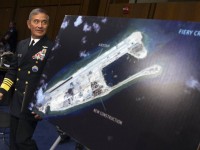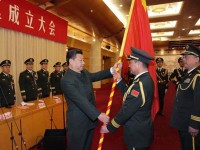Wu Zurong, Research Fellow, China Foundation for Int'l Studies
Jun 29, 2016
American air and sea reconnaissance operations challenge or encroach upon China’s sovereignty and territorial integrity. China and the US have different understandings or interpretations of both an EEZ and territorial waters, and to avoid accidents and enhance the military relationship, the two sides should start serious talks to seek a mutually acceptable solution. As a first step, the US military should limit its reconnaissance operations to the international airspace and high seas that both sides recognize.
Fan Gaoyue, Guest Professor at Sichuan University, Former Chief Specialist at PLA Academy of Military Science
Jun 29, 2016
As a self-labeled world leader, the US should abandon its provocative and destabilizing air and sea exercises in the South China Sea – and sign and abide by UNCLOS wholly and thoroughly instead of citing a few isolated words and phrases to serve its purpose.
Richard Weitz, Senior Fellow, Hudson Institute
Jun 23, 2016
Escalating tensions regarding the Asian-Pacific territorial disputes and other security issues make clear that we need a new approach to dealing with these regional questions. Recent weeks have seen renewed Chinese-U.S. military incidents, stalemated China-U.S. security talks, and a failed China-ASEAN foreign ministers’ meeting.
Zhao Weibin, Researcher, PLA Academy of Military Science
Jun 01, 2016
To predict, prevent and manage crises, especially those triggered by third-party factors, should become the top priority in China-U.S. strategic consultations, in order to establish higher levels and broader scopes of risk-prevention and control mechanisms.
Tian Shichen, Founder & President, Global Governance Institution
May 23, 2016
The recent U.S. reconnaissance activities in South China Sea raises the question if another collision is looming in the air. After examining the existing international conventions and laws regarding airspace and maritime encounters, the author argues that the key to preventing another collision is for the U.S. to stop close-in reconnaissance operations near China’s waters.

Joan Johnson-Freese, Professor, US Naval War College
Apr 15, 2016
The incident between Admiral Harris and the Obama Administration, if there was one, centered on policy. Effectively engaging China at the Nuclear Security Summit was seen much more productive than confronting China with U.S. military might. Offering counsel and then potentially having to implement policy that goes against that counsel is difficult, but a fundamental premise of civil-military relations.

Richard Weitz, Senior Fellow, Hudson Institute
Apr 06, 2016
China’s recent military reforms aim to make the People’s Liberation Army (PLA) a more efficient and effective combat force. They will probably succeed in making at least some progress in these areas. What they do not do is suggest a fundamentally more aggressive or militant Chinese foreign policy—Beijing’s national security strategy remains constant even as the PLA is in flux.
Wu Zurong, Research Fellow, China Foundation for Int'l Studies
Mar 30, 2016
Depending on military might to preserve US dominance of the globe is a strategic error on four counts, and that approach is oblivious to both China’s peaceful rise and the real desires of China’s neighbors.
Hu Bo, Director, the South China Sea Strategic Situation Probing Initiative
Mar 29, 2016
With the deployment of advanced weaponry and coupled with extensive media coverage, the US military has put on a show similar to a Hollywood blockbuster. But war is not imminent: The US simply hopes to increase China’s costs for such sovereignty-defending activities through military, political, diplomatic and media tools – and embarrass China diplomatically.
Zhou Bo, Senior Fellow, Center for International Security and Strategy, Tsinghua University
Jan 08, 2016
Despite disorder in the world, China and the US are finding ways to minimize risks with their armed forces, while counter-terrorism and anti-piracy provide new opportunities for cooperation. While the bilateral relationship is intrinsically volatile and competitive, the two militaries have been remarkably adept at finding common protocols, even in contentious areas like the South China Sea.